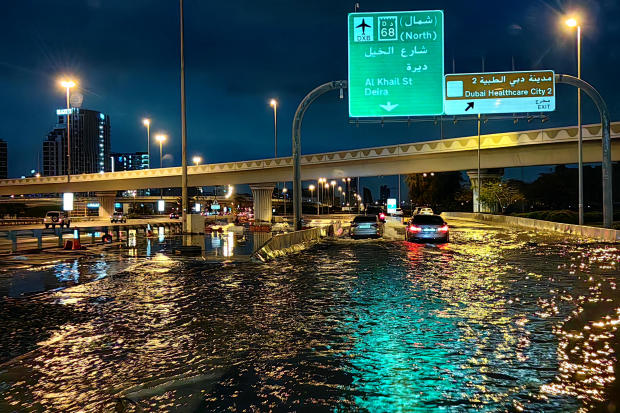Torrential Rains in UAE Cause Historic Flooding, Disrupt Operations at Dubai’s Major Airport
On Wednesday, the United Arab Emirates was recovering from the most severe rainfall it has ever recorded, which caused significant flooding at Dubai International Airport, the world’s busiest airport for international travel. The state-run WAM news agency described the event as “a historic weather event,” noting that it was unprecedented since records began in 1949.
The downpour started late Monday and continued into Tuesday, accumulating approximately 0.79 inches of rain at Dubai International Airport. The weather escalated on Tuesday morning around 9 a.m. local time, bringing more intense rainfall and hail that continued throughout the day.
By Tuesday evening, Dubai had experienced over 5.59 inches of rainfall within a 24-hour period, far surpassing the annual average of 3.73 inches typically recorded at the airport, which serves as a major base for Emirates, the long-haul carrier. The airport faced significant disruptions as standing water inundated taxiways and halted incoming flights Tuesday night. Passengers also faced difficulties accessing airport terminals due to the flooded roads surrounding the area.

Impact on Airport
Dubai International Airport announced through a series of social media posts that it temporarily suspended all operations for about 25 minutes on Tuesday afternoon due to severe weather conditions. Following the halt, the airport decided to divert all incoming flights “until the weather conditions improve.” By late Wednesday morning, both the airport and Emirates, its flagship airline, were advising travelers to avoid coming to the airport unless it was absolutely necessary, as flight check-in remained suspended.
The airport issued a statement via Twitter: “Flights continue to be delayed and diverted. Please check your flight status directly with your airline. We are working hard to recover operations as quickly as possible in very challenging conditions.”
The impact of the flooding was evident, with one couple describing the scene at the airport as “absolute carnage.” Speaking to The Associated Press under the condition of anonymity, due to the strict local laws against critical speech, they reported, “You cannot get a taxi. There’s people sleeping in the Metro station. There’s people sleeping in the airport.” They managed to catch a taxi to a location near their home, 18 miles away, but were stopped by floodwaters. A bystander assisted them in climbing over a highway barrier with their carry-on bags and duty-free purchases.
Paul Griffiths, CEO of the airport, acknowledged the persistent flooding issues on Wednesday morning. He noted that every available spot for safely parking aircraft was occupied, and some planes had been redirected to Al Maktoum International Airport at Dubai World Central, the secondary airport in the city-state.
Speaking to Dubai Eye, a state-owned talk radio station, Griffiths expressed the severity of the situation: “It remains an incredibly challenging time. In living memory, I don’t think anyone has ever seen conditions like it. We are in uncharted territory, but I can assure everyone we are working as hard as we possibly can to make sure our customers and staff are looked after.”
Does “cloud-seeding” contribute?
Rainfall affected not only the UAE but also Bahrain, Oman, Qatar, and Saudi Arabia, with the UAE experiencing particularly intense showers. One factor that might have contributed to the heavy rains in the UAE is “cloud seeding,” a process where small planes disperse salt flares into clouds to enhance precipitation. According to meteorologists from the National Center for Meteorology, up to seven cloud-seeding missions were conducted prior to the rainfall. While the center did not respond to inquiries, flight-tracking data analyzed by AP indicated that a plane involved in the UAE’s cloud-seeding operations was active on Sunday.
The UAE, which depends largely on desalination plants for water, uses cloud seeding to supplement its scarce groundwater reserves.
As the storm hit, flooding prompted widespread school closures across the UAE, a federation of seven sheikhdoms. Government workers and many others were advised to work remotely, and some roads were impassable due to deep floodwaters. Authorities deployed tanker trucks to clear the streets and highways, and in some cases, residents had to remove water from their homes themselves.
The country’s rulers have not provided comprehensive damage or casualty figures, though there were reports of individuals sleeping in their flooded cars. In Ras al-Khaimah, police reported the death of a 70-year-old man whose vehicle was swept away by the floodwaters. Fujairah, located on the UAE’s eastern coast, recorded the highest rainfall with 5.7 inches.
Following the disruption, authorities again canceled school and mandated remote work for Wednesday.
Rain is rare in the UAE, which typically sees little precipitation outside of the cooler winter months. The infrastructure, lacking adequate drainage, often fails to manage even periodic rainfall, leading to floods.
In neighboring Oman, recent heavy rains have been catastrophic, resulting in the deaths of at least 19 people, including 10 schoolchildren and an adult in a tragic incident, as reported by Oman’s National Committee for Emergency Management. This event has drawn expressions of condolence from leaders across the region.
This phenomenon is part of a broader pattern of extreme weather events around the world, which climatologists attribute to human-driven climate change. Similarly, southern Russia and Central Asia have been grappling with significant rainfall and snowmelt, causing extensive evacuations and more than 60 fatalities in Pakistan and Afghanistan.
Also Read, U.K. House of Commons to Vote on Pioneering Tobacco and Vapes Bill
UN Forum Highlights Urgency for Reparations and Continued Support for People of African Descent
Bookmark and Follow us for more News



